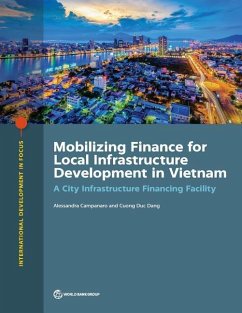
Advancing Cloud and Data Infrastructure Markets
Strategic Directions for Low- And Middle-Income Countries
Versandkostenfrei!
Versandfertig in über 4 Wochen
34,99 €
inkl. MwSt.

PAYBACK Punkte
17 °P sammeln!
The World Development Report 2021: Data for Better Lives underscored today's unprecedented generation and flow of digital data and noted that much of the value remains untapped. To realize the enormous potential, data need to be supported by technologically advanced infrastructure to capture, analyze, share, and use them efficiently and effectively to benefit economies and societies. Cloud and data infrastructure presents the technological means to enable these processes, but the markets for these services are largely located in high-income countries. Countries with limited access to affordabl...
The World Development Report 2021: Data for Better Lives underscored today's unprecedented generation and flow of digital data and noted that much of the value remains untapped. To realize the enormous potential, data need to be supported by technologically advanced infrastructure to capture, analyze, share, and use them efficiently and effectively to benefit economies and societies. Cloud and data infrastructure presents the technological means to enable these processes, but the markets for these services are largely located in high-income countries. Countries with limited access to affordable services will lag in the ability to harness at scale the advanced technologies, such as machine learning and artificial intelligence, and to realize the potential corresponding social and economic gains. Advancing Cloud and Data Infrastructure Markets: Strategic Directions for Low- and Middle- Income Countries is part of a joint World Bank-IFC effort to support countries on their path to developing these markets. This report analyzes the key drivers of cloud and data infrastructure growth in these settings. It examines the business models, policies, and regulatory environment shaping the market trends as data from public and private sectors migrate to the cloud, and it explores the challenges in attracting investments. The report notes that although there is no one-size-fits all solution, essential elements to foster an enabling environment include bold vision and decisive government action to provide the following: 1.Stable business environments; technically skilled workforces; clear and supportive regulatory landscapes; and resilient, reliable, and affordable energy and broadband infrastructure 2.Stimulus for demand by digitalizing public services and migrating them to the cloud, signaling trust and confidence in cloud-enabled services and encouraging domestic businesses to follow suit 3.Streamlined measures to shorten the time from concept to launch of cloud infrastructure 4.Regulations and incentives to reduce the environmental footprint of cloud and data infrastructure, including renewable energy generation and efficient utilization of physical space at the design stage. Public and private stakeholders working together will expedite the ability of all countries and economies to successfully harness the transformative benefits of the cloud to help realize the goal of a world without poverty on a livable planet.












